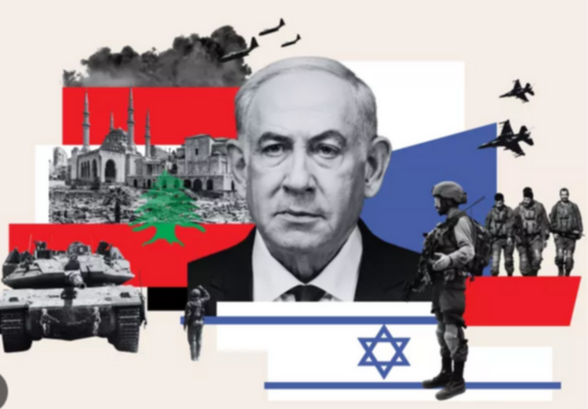
Screenshot from Newsweek El Salvador
By Alfredo García Almeida, a journalist and international analyst and collaborator from Mérida, Yucatán.
The conflict between Israel and Lebanon is turning into an all-out war, with the international community's calls for a cessation of hostilities in the Middle East being heard but not acted upon, while Israel continues its attacks on the Gaza Strip and, in coordination with the United States, threatens Iran with military retaliation.
The Lebanese Armed Forces have confirmed that Israeli army troops have crossed the so-called 'Blue Line' separating the two neighboring countries. According to the Lebanese authorities, Israeli troops entered "about 400 meters" at two points on the line, at Jerbet Yarun and at Odaisé, the daily L'Orient Le Jour reported.
An Israeli army assessment admits for the first time direct clashes between Hezbollah and Israeli forces on Lebanese territory, following the bombardment of Beirut and the Gaza Strip the night before. For the first time, the Israeli army has hinted at direct clashes in an operation that has allowed "the elimination of terrorists and the destruction of their infrastructure, more than 150 so far", including Hezbollah headquarters, weapons depots and rocket launchers, according to a statement.
Eight Israeli soldiers were killed in an ambush by Hezbollah militias during the Israeli ground offensive that began in the early hours of Tuesday morning.
Also on Wednesday, Hezbollah announced "hand-to-hand" fighting against a group of "infiltrated" Israeli soldiers in the southern town of Maron al-Ras, near the border between the two countries.
Israel announced on Wednesday that it was sending more soldiers into southern Lebanon, while ordering the evacuation of some 20 villages about 20 kilometers from the border. It also said its air force would continue to attack Hezbollah 'targets' in Lebanon, such as observation posts and infrastructure on the southern line.
For its part, Hezbollah has claimed more than a dozen rocket, missile or artillery attacks on positions and groups of soldiers in various parts of northern Israel, as well as in more distant areas such as the city of Haifa. In this context, the armed wing of Hamas claimed responsibility for last Tuesday's attack on a tram station in Jaffa, south of Tel Aviv, which left 7 dead and at least 16 wounded.
"As long as the occupation continues to annihilate our people and our children in Gaza, it will get used to seeing its dead in the streets of our occupied cities," the Ezzeldin al-Qassam Brigade said in a statement published by Filistin, a militia sympathetic to the rebels.
Eight Israeli soldiers were killed in an ambush by Hezbollah militias in the Israeli ground offensive that began in the early hours of Tuesday morning, and on Wednesday Hezbollah announced "hand-to-hand" fighting against a group of "infiltrated" Israeli soldiers in the southern town of Maron al-Ras, near the border between the two countries.
"Washington opposes the bombing of nuclear facilities, but other options are being considered, such as attacks on oil infrastructure, military bases or assassinations of high-ranking officials," the Spanish daily notes.

